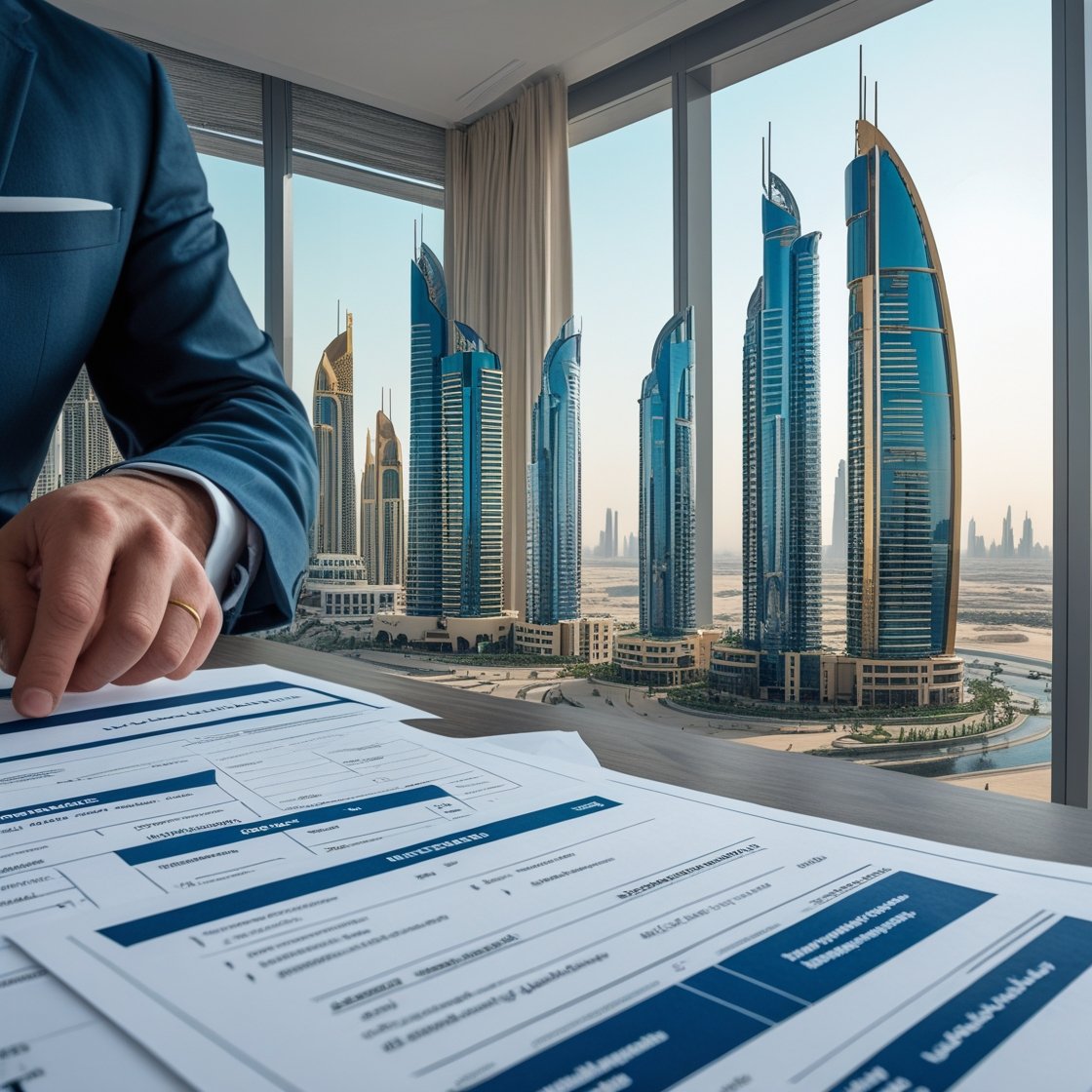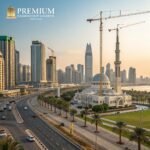Are you dreaming of owning a piece of paradise? A stunning beachfront villa, a modern apartment with breathtaking views – perhaps even a lucrative investment property in Dubai’s thriving market?
It’s tempting to believe that wealth comes solely from earning more. But the reality is far more strategic. Many are missing out on the chance to build serious assets simply because they don’t know where to start.
Imagine stepping into a future free of financial worries, with properties generating passive income and appreciating in value. This guide will show you how to confidently navigate the UAE property landscape.
Let’s dive into the secrets – it might just reveal the long lost way to build your dream portfolio.
Investing in Luxury Estates
The idea of owning a lavish property in the UAE might seem like a distant dream, doesn’t it? But often, the biggest obstacle isn’t finding the perfect estate – it’s believing you can actually afford it.
That glossy brochure showcasing beachfront villas and opulent mansions can feel incredibly alluring, yet the initial price tag can quickly become overwhelming.
While many envision a life of luxury, others are establishing long-term wealth through strategic property investments in prime locations.
The key difference lies in understanding that acquiring premium real estate isn’t simply about immediate gratification; it’s about building lasting value and generating substantial returns.
Every moment spent chasing a fleeting desire for instant prestige is time not dedicated to securing a future of financial freedom.
But here’s what rarely gets discussed: achieving true luxury property ownership isn’t solely dependent on high-end purchases. It’s about making informed decisions and crafting a sophisticated investment strategy tailored to your goals.
And that’s precisely what this guide will reveal…
UAE Property Trends – Shifting
Despite shifts in global markets, the UAE property sector is showing a dynamic movement. It’s important you understand where this market is heading if you are considering an investment.
The trend currently points towards increased demand for luxury properties and residential developments along coastal areas. This reflects a growing desire amongst residents to live near beaches and enjoy waterfront living. There’s also rising interest in sustainable and smart homes, driven by government initiatives promoting eco-friendly practices.
These trends are largely influenced by population growth within the UAE, particularly among expatriates seeking premium lifestyles. Furthermore, ongoing infrastructure projects and economic diversification efforts continue to boost confidence in the long-term viability of real estate investments.
Historically, affordable housing options have been a major focus. However, current market dynamics are demonstrating a clear preference for higher-end properties with sophisticated amenities and prime locations.
You should be aware that rental yields are also reflecting these changes, with luxury apartments commanding significantly higher rates than previously seen. This means careful consideration is needed when assessing potential returns on investment – focusing on areas experiencing the strongest growth is key.
Strategic Locations for Returns
Yes, strategically choosing a location when investing in property within the UAE can significantly impact potential returns. Let’s explore some areas that are currently showing strong growth prospects.
Areas like Dubai South and Meydan offer fantastic opportunities for investment due to ongoing infrastructure developments and planned residential communities. These locations are experiencing considerable demand, which naturally drives up property values. Areas in Sharjah, particularly near the Expo City sites, also show promising potential as they benefit from increased connectivity and tourism.
The government’s focus on diversifying the economy beyond oil is a key factor driving growth across many regions within the UAE. This has led to significant investment in infrastructure projects which are boosting demand for residential and commercial properties.
Compared to older, established areas of Dubai, these newer locations often offer more affordable entry points while still presenting strong long-term appreciation potential. It’s important to note that market trends can shift quickly so thorough research is always necessary.
When considering a location for investment you should consider the proximity to key amenities such as transport links, schools and retail outlets. These factors will have an impact on value over time.
Assessing Potential Rental Yields
Just understanding rental yields is absolutely key when looking at property investment in the UAE. It’s not just about buying a beautiful building; it’s about ensuring your money keeps generating income for you.
Let’s start with what a rental yield actually *is*. It’s basically how much rent you can realistically expect to earn from a property, expressed as a percentage of its total value. There are two main types: gross and net.
A ‘gross’ yield looks at the potential income before expenses like property management fees or maintenance costs. A ‘net’ yield takes those expenses into account, giving you a more accurate picture of what you’ll actually pocket. Generally, aiming for a net yield of around 6-8% is considered healthy in many areas of Dubai and Abu Dhabi – but it really depends on the specific property and location.
You need to consider factors that influence rental yields too. Location plays a massive role—prime locations near business districts, beaches, or metro stations tend to command higher rents.
Also, think about the type of property – apartments are often easier to rent out quickly than villas, and demand for luxury properties is usually greater than that for budget options. Researching comparable rentals in the area will give you a strong baseline for your potential yield calculations.
So, carefully assessing potential rental yields – factoring in gross and net figures, location, property type, and market trends—is crucial to making smart investment decisions when exploring UAE properties.
Guiding Complex Legal Structures
Have you ever considered the legal landscape when investing in property within the UAE? It’s a surprisingly intricate area, and understanding the different structures is absolutely key to success.
Let’s talk about the most common options— freehold versus leasehold. Freehold gives you full ownership rights, allowing you to sell or mortgage the property as you wish. However, it often comes with stricter regulations and higher costs initially. Leasehold offers a more accessible entry point, particularly for investors seeking long-term rental income.
Leasehold properties typically have longer lease terms – 25 years or more – providing stability and predictable cash flow. But you need to be aware that the landlord retains ownership, and your investment’s value is tied to the remaining term of the lease.
Then there’s the matter of company structures— setting up a Limited Liability Company (LLC) can offer significant tax advantages and operational flexibility. However, it requires more administrative overhead and compliance requirements.
Structuring your investment through an LLC allows you to manage risks effectively and potentially benefit from favorable tax treatments depending on the specific circumstances. It’s a decision that demands careful consideration with expert legal advice.
Ultimately, Guiding these complex legal structures requires thorough research and professional guidance. Understanding the nuances of freehold versus leasehold, along with the potential benefits of company formations, is crucial for making informed investment decisions in the UAE property market.
Financing Your Dream Purchase
The first thing to consider when financing your dream property in the UAE is understanding the different options available. There’s a lot more than just a standard mortgage – it’s about finding what best suits you.
You can explore various types of loans, from fixed-rate mortgages to variable rate ones, each offering a unique level of stability and potential for savings. It’s important to understand how interest rates fluctuate and how that impacts your monthly payments.
For example, a fixed-rate mortgage provides predictability – the same payment month after month. A variable rate loan can be more flexible but carries some risk if interest rates rise. Weighing these options carefully is key.
Down payments are also a significant factor. The UAE typically requires a minimum down payment of 20%, although this can vary depending on the property and the lender.
Consider your financial situation – what you have saved, and how much you’re comfortable borrowing. There are schemes available to help with larger deposits too.
Ultimately, financing your dream purchase in the UAE requires thorough research and understanding of your options. Taking the time to explore different loan types and down payment strategies will ensure a smooth and successful investment.
Understanding Sharia-Compliant Investments
So, understanding Sharia-compliant investments means recognizing that certain financial instruments don’t align with religious principles. It’s about ensuring your investment choices reflect your beliefs.
This often centers around what types of businesses you’re investing in. Certain industries – like alcohol production, gambling, or weapons manufacturing – are prohibited under Islamic finance guidelines.
For example, a bank loan with interest (riba) is strictly forbidden. Instead, you’ll find options like ‘murabaha,’ where the bank buys an asset and sells it to you at a slightly higher price, effectively financing your purchase without charging direct interest.
Another key aspect involves ensuring investments aren’t linked to unethical activities – things like companies involved in pork processing or those operating in industries deemed harmful.
You’ll often see a preference for investments in sectors like healthcare, education, and sustainable agriculture which are generally considered more aligned with Islamic values.
Essentially, Sharia-compliant investing is about finding financial products that not only offer potential returns but also align with your personal faith and ethical considerations. It’s a way to build wealth while staying true to your convictions.
Due Diligence – Beyond the Brochure
Think about brochures— they’re glossy, full of beautiful pictures, and paint a really enticing picture. But sometimes, that doesn’t tell you the whole story. Due diligence goes far beyond what’s on the brochure. It’s about truly understanding what you’re investing in.
You need to dig deeper into property records. Confirming ownership is crucial— make sure the seller actually has the legal right to sell the property.
A title search will reveal any liens, mortgages, or disputes associated with the property. This protects you from inheriting someone else’s problems.
Then, investigate zoning regulations. Confirming that your intended use for the property is permitted by local authorities is essential.
Future development plans in the area could drastically change things— a new shopping center or high-rise building might affect rental yields or resale value.
So, due diligence isn’t just about admiring the view; it’s about protecting your investment by thoroughly investigating every aspect of the property and its surroundings.
Mastering the Art of Negotiation
It’s like knowing exactly when to make an offer—that’s a huge part of mastering negotiation in property investment.
Understanding market trends is key; you need to know what properties are truly worth, not just what someone else is willing to pay.
Research comparable sales – look at recently sold properties nearby and analyze their features, size, and condition. This gives you a solid baseline for your valuation. Don’t be afraid to adjust based on unique selling points or potential renovations.
You also need to understand the seller’s motivations—why are they selling? Are they in a hurry? Knowing this can give you leverage.
Perhaps they need cash quickly, or maybe they’re not getting the price they hoped for. Being able to address these concerns directly during negotiation shows you’ve done your homework and builds trust.
Essentially, mastering negotiation is about combining solid market knowledge with an understanding of the seller’s perspective—that’s how you secure the best possible deal on your dream property.
Emerging Markets & Future Growth
Remember, if you’re considering a property investment in the UAE, understanding where growth is headed is absolutely key. The ‘Emerging Markets & Future Growth’ aspect isn’t just about picking the flashiest new developments – it’s about identifying areas poised for significant increases in value and rental yields.
Currently, markets like Sharjah are seeing considerable expansion, particularly with ongoing infrastructure projects and a focus on attracting businesses and residents. This translates to increased demand for residential properties.
The development of new communities – think Arabian Ranches III or areas around the Aljada project – is driving up property prices and rental rates as these locations become more established. It’s important to note that this growth isn’t just about building; it’s also tied to increased amenities, transport links, and economic opportunities.
Looking further afield, areas like Ras Al Khaimah are experiencing a transformation with luxury tourism developments – projects like the Marjan Island – attracting significant investment and boosting property values.
This creates a ripple effect, benefiting surrounding communities as well. Investors who recognize this potential early on could see substantial returns. It’s about spotting these shifts before they become widely apparent.
Building a Sustainable Portfolio
Even building a sustainable portfolio in the UAE starts with understanding your goals. What kind of returns are you hoping for? Are you looking for long-term growth or steady income streams? Answering these questions is key to shaping your investment strategy.
Diversification is absolutely crucial— don’t put all your eggs in one basket, especially when investing in the UAE market.
Consider a mix of property types – residential, commercial, and even industrial – to mitigate risk. Different sectors respond differently to economic changes, so spreading out gives you more stability. Researching areas with strong growth potential is also important.
Focus on long-term trends— the UAE’s economy is built on diversification, moving away from oil dependence.
Investing in sectors like tourism, technology, and renewable energy can offer significant returns over time. Staying informed about government initiatives and economic forecasts helps you make smart decisions.
Ultimately, a sustainable portfolio means balancing risk and reward, diversifying your holdings, and focusing on long-term growth within the dynamic UAE market.
Tax Implications & Financial Planning
As tax implications and financial planning become key when considering a property investment in the UAE, you need to understand how these factors can impact your overall returns.
Specifically, you’ll want to consider potential income taxes on rental yields. The UAE currently doesn’t levy income tax on most residents, but there are still other taxes that may apply.
For example, there are capital gains taxes if you sell a property for a profit – and these rates can vary depending on the type of asset. Understanding these differences is key to planning your investment strategy.

You also need to factor in registration fees, transfer fees, and annual property registration fees which can add up quickly. These costs are typically paid by the buyer.
Furthermore, you’ll want to consider how mortgage interest is treated – as it’s generally tax-deductible, offering a significant advantage when calculating your investment’s profitability.
Ultimately, careful financial planning and understanding these nuances will help you make informed decisions about your property investments in the UAE, ensuring you maximize returns while minimizing potential tax liabilities.
Long-Term Value & Estate Legacy
While considering a property investment in the UAE, it’s important to think beyond just immediate returns. You need to consider how this purchase will build wealth for generations to come.
Long-term value is directly tied to choosing locations that are expected to grow and develop – areas with planned infrastructure projects, new business hubs, or increased residential demand.
Investing near emerging transport links can significantly boost property values as connectivity improves. Similarly, properties close to developing educational institutions often see an increase in desirability and therefore value over time.
Thinking about estate legacy means considering the potential for inheritance and how your investment might benefit future generations. It’s not just about maximizing profit; it’s about creating a lasting asset.
A well-maintained property in a desirable location can provide a stable source of income through rental yields, ensuring financial security for those who inherit it. Furthermore, strategically chosen properties can appreciate significantly over decades, building substantial wealth.
Ultimately, you’re not just buying bricks and mortar; you’re investing in stability, growth, and the future – a tangible legacy that will endure long after your own time.
Turning Desert Dreams into Brick and Mortar: It’s Within Reach!
Investing in property in the UAE can feel like Guiding a shifting sand dune – exciting, but potentially overwhelming.
However, understanding the landscape is key to unlocking incredible opportunities. The market presents unique advantages, from burgeoning residential developments to established commercial hubs, and savvy investors are recognizing the potential for strong returns. Careful research into areas like Dubai’s Downtown or Abu Dhabi’s Saadiyat Island reveals a diverse range of properties catering to varying investment strategies – whether it’s long-term rental income or capital appreciation.
The sooner one delves deeper into these possibilities, the better positioned they are to capitalize on emerging trends and secure prime assets before prices rise further. Don’t let hesitation hold you back from building a portfolio that reflects your financial goals. A proactive approach – fueled by knowledge – dramatically increases the chances of achieving substantial success.
Start exploring these opportunities today, connect with local experts, and begin crafting a future filled with prosperous property investments in the United Arab Emirates. Let’s build your legacy, one investment at a time!
Disclaimer: the information provided is subject to change based on updates or modifications to local laws and regulations.






Leave a comment